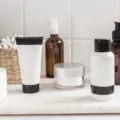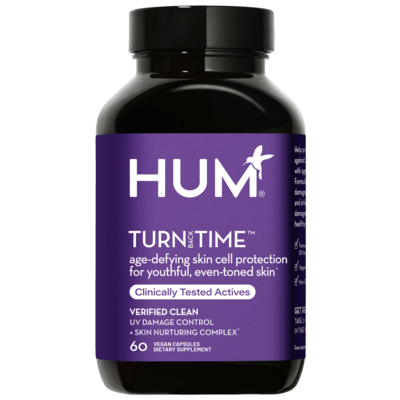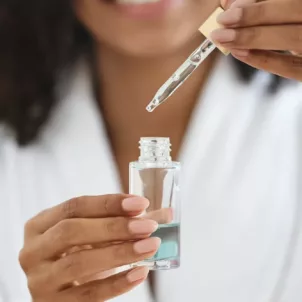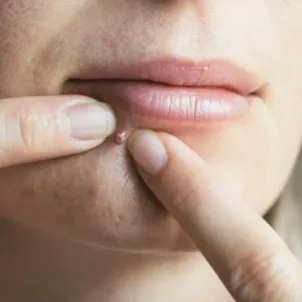Can sunscreen cause acne? A dermatologist sets the record straight. Plus: how to find the best sunscreen for acne-prone skin.
In the wonderful world of skincare, there’s one fact you’ll stumble upon time and time again. According to beauty editors, estheticians, dermatologists, and scientific studies alike, sunscreen is the gold standard for skin health and protection.
However, is sunscreen bad for acne?
For a definitive answer, we consulted board-certified cosmetic dermatologist Michele Green, MD, who specializes in acne treatments at her NYC practice.
Understanding Sunscreen and Acne
Does sunscreen cause acne? Dr. Green confirms that yes—some sunscreens can, in fact, cause acne by clogging your pores.
But why and how does this happen?
“Certain sunscreens contain chemicals that can irritate your skin, making it more susceptible to acne breakouts,” she begins. Such active ingredients tend to be comedogenic (aka pore-clogging), which Dr. Green says may lead to the development of comedones or pustular acne.
Further, she says that the mechanisms of certain types of sunscreens can also contribute to breakouts.
For instance, chemical sunscreen (as opposed to physical/mineral sunscreen) works by absorbing UV light and converting it to heat, which the body then releases. “Combined with certain chemicals in sunblock, the heat can act as an occlusion to your skin and make you sweat more,” Dr. Green explains.
While occlusive ingredients are great at retaining moisture, they can also exacerbate acne. By creating a protective seal of sorts, occlusions can end up “trapping this sweat and increased sebum in your skin, [which then] clogs your pores and causes an increased amount of acne,” she continues.
Identifying Acne-Causing Ingredients in Sunscreens
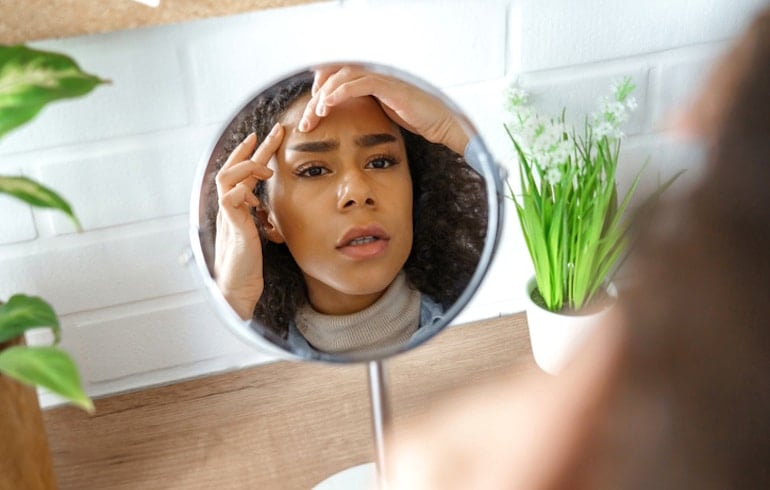
Is your sunscreen causing acne problems? At this point, you’re probably wondering if your own sunscreen is behind your breakouts.
To find out, you can first look at the type of sunscreen you’re using and its active ingredients. Other tip-offs are if the formulation:
- Includes oil
- Isn’t explicitly labeled as non-comedogenic sunscreen
However, you can also take a more observational approach. If you notice you have more comedones or pustules when you apply your go-to (or new) SPF, Dr. Green says that your sunscreen is likely contributing to your acne.
Simultaneously, it’s important to rule out other root causes of acne and flare-ups, including but not limited to:
- Sensitivity to another skincare product
- Your diet
- Hormones
- Stress
- Gut imbalances
- Skin purging
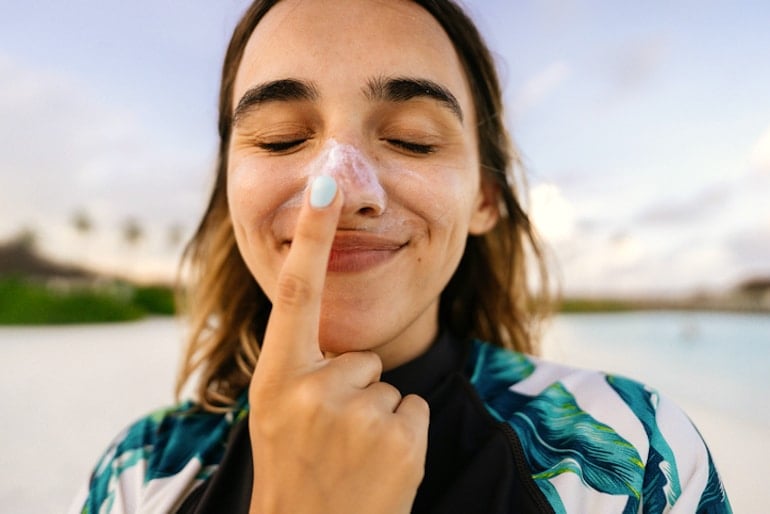
Conversely, does not wearing sunscreen make acne worse?
And here, my friends, is where we run into a catch-22.
It turns out that ditching sunscreen completely—which we never, ever advise—not only contributes to long-term skin damage, but can also make your acne’s lifecycle worse.
“For example, if you have post-inflammatory hyperpigmentation (PIH) from acne or acne scars, these marks will get much worse and darker from sun exposure,” Dr. Green warns. She also says the same goes for red marks that result from acne, as “the sun will increase the reddish appearance of these breakouts and make them more difficult to remove and treat.”
Dr. Green then reinforces the fact that excess sun exposure without adequate UV protection can worsen other skin concerns. This includes manifestations of hyperpigmentation and premature aging, such as:
- Melasma
- Photoaging
- Wrinkles
On top of that, many people—especially those who struggle with breakouts—incorporate photosensitive ingredients into their skincare routines, which include:
- Retinol/retinoids
- AHA + BHA exfoliants
- Lightening agents for dark spots
Such ingredients and products are helpful to manage breakouts and support a fresh complexion. However, they increase your skin’s sensitivity to UV light and thus make SPF even more important to apply.
“By continuing to use these ingredients for your acne and not using sun protection, your skin is more susceptible to hyperpigmentation, making both your dark marks and acne scars worse,” Dr. Green explains.
Choosing the Right Sunscreen for Acne-Prone Skin
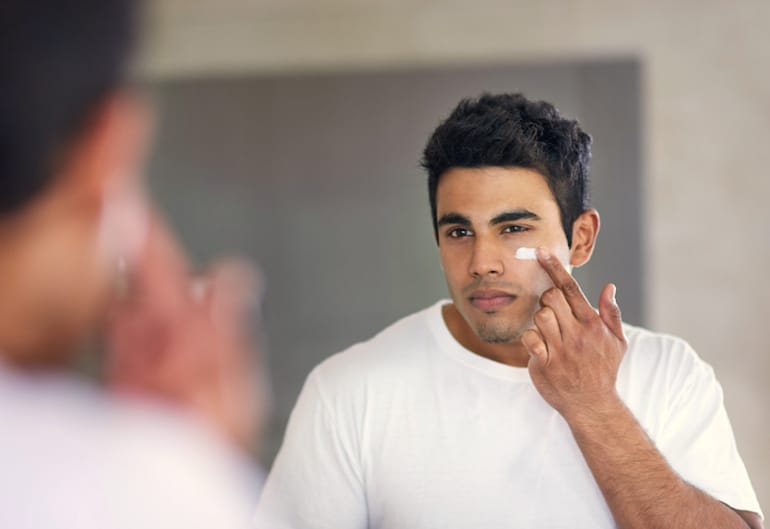
As we can see, while sunscreen can cause acne, it’s still essential to apply it. For that reason, you simply have to seek out the best sunscreen for acne-prone skin.
To help you do just that, Dr. Green shares the following tips.
- Opt for non-comedogenic sunscreen. First, to decrease the likelihood of clogging your pores, look for an oil-free, non-comedogenic sunscreen. Dr. Green says that such a formula will minimize the chances of developing breakouts (and thus hyperpigmentation and scarring, as well). Additionally, a 2013 review in the Journal of Clinical and Aesthetic Dermatology champions spray and gel-based sunscreens for acne and oily skin.
- Choose a formula with niacinamide. Dr. Green calls out niacinamide’s anti-inflammatory properties for its ability to help control breakouts. Better yet, a 2008 study demonstrates this ingredient’s particular efficacy in reducing comedones and pustules, which we learned are the two types of acne caused by sunscreen.
- Try out mineral sunscreen. Since chemical sunscreens can make you sweat more (by trapping heat) and clog your pores, you may be better off opting for a mineral-based sunscreen. In particular, Dr. Green prizes lightweight formulas with anti-inflammatory zinc oxide as the best sunscreens for acne-prone skin.
Proper Application and Removal Techniques
Say goodbye to the thought “sunscreen makes me break out,” as all of these tips and tricks are meant to help alleviate that issue. You can take it all a step further and be mindful of how you apply and remove your daily dew. Make sure to apply it to a clean dry face. Be sure that your hands are clean and washed. Gently apply the sunscreen or spray evenly on the face, ears, and neck. Make sure to layer accordingly throughout the day. When removing your sunscreen gently cleanse your face as you normally would and apply your standard nighttime skincare routine.
Additional FAQs
Can SPF cause acne?
SPF itself doesn’t cause acne, but certain formulations with heavy or pore-clogging ingredients can contribute to breakouts.
Why does sunscreen make me break out?
Sunscreens with comedogenic ingredients, fragrances, or oils may clog pores and irritate skin, leading to breakouts.
How can I prevent breakouts from sunscreen?
Choose non-comedogenic, oil-free, and fragrance-free sunscreens designed for acne-prone skin and cleanse your face thoroughly at the end of the day.
Is mineral sunscreen better for acne-prone skin?
Yes, mineral sunscreens with zinc oxide or titanium dioxide are gentler and less likely to clog pores, making them ideal for acne-prone skin.
What ingredients in sunscreen should I avoid if I have acne?
Avoid heavy oils, silicones, and comedogenic ingredients like isopropyl myristate or coconut oil.
Can not wearing sunscreen make acne worse?
Yes, UV exposure can increase inflammation and darken acne scars, making them more noticeable and harder to heal.
How often should I reapply sunscreen if I have acne-prone skin?
Reapply every 2 hours, especially if outdoors, and opt for lightweight formulas to prevent buildup.
Are there sunscreens specifically formulated for acne-prone skin?
Yes, look for sunscreens labeled as “non-comedogenic,” “oil-free,” or “designed for sensitive or acne-prone skin.”
Does sunscreen help with acne scars?
Yes, sunscreen protects scars from darkening and prevents further skin damage, aiding in their healing process.
Can I use sunscreen while on acne medication?
Yes, it’s essential to use sunscreen, as many acne treatments increase skin sensitivity to sunlight.
Final Thoughts
All things considered, while sunscreen can cause acne, it doesn’t have to—as long as you choose the right kind.
It’s also worth noting that while the tips above serve as a great guide, you don’t necessarily have to check off every box. For instance, some chemical sunscreens are oil-free and gel-based, thus making them more suitable for acne-prone skin.
This point leads to my final sendoff: recommending Elta MD’s UV Clear Broad-Spectrum SPF 46. The oil-free formula pairs mineral zinc oxide with chemical octinoxate, as well as niacinamide. (Better yet, it doesn’t leave a white cast, which makes it especially attractive to people with darker skin tones.) All in all, this mineral/chemical hybrid gets my vote as the best sunscreen for oily, acne-prone skin.

